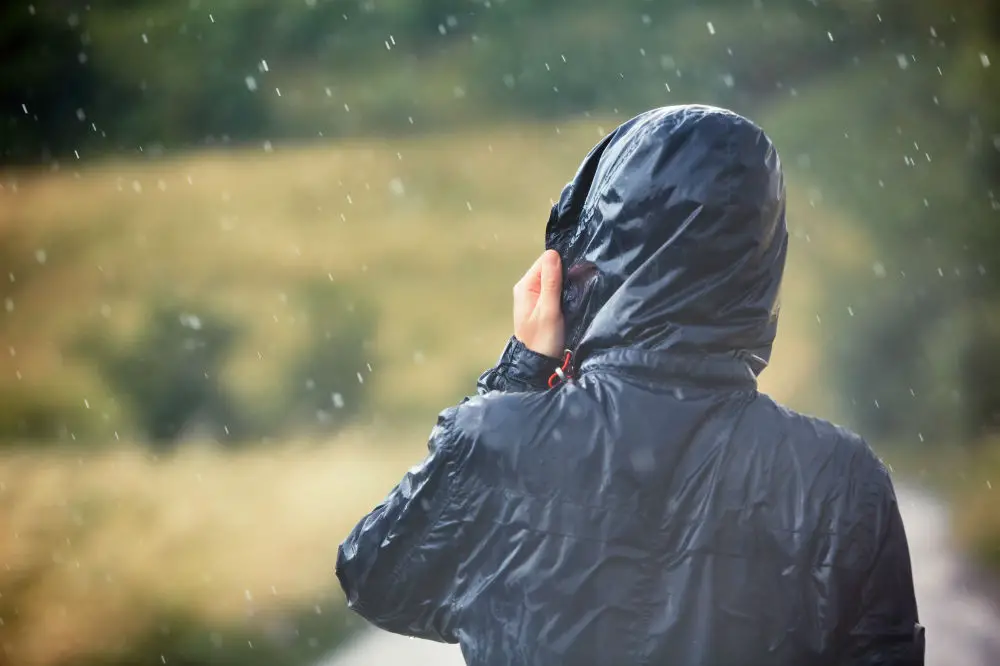During season raincoats are our part and parcel of lives. The simple reason is that raincoat is 100% waterproof that keeps rain droplets away.
But what makes a raincoat 100% waterproof?
Actually, it is the DWR coating that is raincoats are coated in double water-repellant coatings, a hydrophobic coating that keeps them resistant to water as well as breathable!
Otherwise, talking of the material, raincoats are made from the blend of any of the following fabrics: polyester, cotton, nylon, rayon, polyurethane laminate, Gore-Tex, etc.
Now, the question is…
Is polyester good for rain?
For anything to be 100% waterproof, the seams have to be sealed with ultrasonic welding which do not involve the use of threads to join the materials.
Polyester is a high-density fabric and its threads are considered to be water-repellant which repels water while standing in the rain. Still polyester is not 100% waterproof because water can enter through the gaps in the weaves of the fabric. So, if you want something to get submerged in water for a long period of time, polyester might not serve the purpose.

This article will help you to find out whether polyester is a good for rain or not, what are the best materials for repelling rain water and also the pros and cons of wearing polyester in the rain.
So, let’s have a detailed look into the world of polyester…
What happens to polyester when it gets wet?
The threads from which polyester is made are waterproof as they are plastic strands! But the main problem arises when the polyester threads are woven into a fabric.
It is then that the garment has gaps from the thread weaves (which is a must for joining the pieces of the fabric together).
Though water will not be absorbed by the threads of polyester, still water can get through the gaps in the weaves and make the garment wet.
And when polyester gets wet, it can have some bad smelling odor (only in case the material is wet for along time) but polyester dries out very fast.
See also: What Kind of Material are Work Shirts Made Of?
Which fabric is best for rainy season?
If you want something for heavy rain through which not even a single droplet of water can pass through or the fabric does not soak water at all even when dipped in water, you should be choosing amongst any one of the following fabrics:
-
-
- TPU
- PUL
- PVC coated polyester
- Rubber coated polyester
- Plastic coated polyester
- Vinyl
- Nylon taffeta
- Oilcloth
-
Can water pass through polyester?
Polyester is a water-repellant fabric.
That said, the waterproof properties apply only to the threads of the fabric and also depends on the density of the polyester clothing you are wearing.
The more the number of threads and the thicker the density of the polyester, the more will be its water-repelling properties which means water cannot pass through the threads of the polyester.
But when a polyester is used for making any clothing, the seams, the zippers, the stitching also come into consideration and these are the parts through which water can enter the garment.
Also, there are pores in the polyester fabric which makes them breathable and there is a possibility that water can enter through those pores when emerged in water.
The threads of polyester are also woven while making the garment and water can enter through the airgaps present in the weaving pattern.
Therefore, polyester cannot be 100% waterproof unless it is coated with extra materials like PVC or rubber or other DWP coatings.
See also: 10 Best Waterproof Work Pants for Men
Comparison of polyester with other materials
Now, let’s look at some of the most waterproof fabrics and then compare them with our today’s material, i.e., polyester.
| Type of fabric | Fabric | Properties | When to use |
|---|---|---|---|
| Weatherproof fabrics | Forms beads of water on its surface thus repelling some amount of water | They are good for light rain | |
| Water-resistant fabrics | Nylon, wool, polyester | Resists water to a great extent but not completely | They are good for heavy rain but not for getting submerged in water |
| Waterproof fabrics | PVC coated polyester, vinyl, ripstop nylon, PUL, nylon taffeta, oilcloth and laminated cotton | They will not allow any water to get through them which means they are 100% waterproof | They can be worn in the harshest of climates, including heavy rain, under the water and snow |
So, you see, polyester falls under the 2nd category of fabrics that are water-repellant and not 100% waterproof. Polyester has to be coated with the 3rd category of fabrics in order to make them 100% waterproof.
Reasons for using polyester in the rain
For this, let us first understand how polyester is made!
Polyester is made from synthetic chemicals that are derived from petroleum. The process of making polyester is called polymerization in which single molecular forms of alcohol are combined with a certain type of acid to make plastic ribbons.
When these plastic ribbons dry put, they become hard and brittle and then these small strands of plastic are melted and spun into polyester threads.
However, when these threads are woven into a fabric, the airgaps between the weaves can let water enter into the garment.
But if the count of the threads is increased, the water-repellant capacity of the polyester increases which makes them perfect for wearing in the rain.
The other reasons of wearing a polyester garment in the rain is that polyester is breathable which does not form water vapors inside the material and also keeps you dry all day long. Also, polyester is dries out super-fast which is a bonus for wearing them in the rain.
Pros of using polyester:
Polyester has many advantages over other fabrics like its more breathable and waterproof than nylon, more water-repellant and fast drying than cotton and also:
-
-
- It is very durable besides being light in weight
- It does not wrinkle
- It is resistant to stains
- It dries out pretty fast
- It is easy to clean and maintains its shape well
- It is breathable yet water-repellant (though not completely the both)
-
Cons of using polyester:
However, polyester has got some disadvantages to it as well:
-
-
- It has got typical odor to itself
- It shrinks with heat
- Being made of synthetic fibers, it can cause allergies to some suffering from eczema, fungal infections, etc.
- It is prone to static build-up
-
It’s time to wrap up!
If you want to beat light rain, choosing polyester is the smartest choice for you because polyester is a bit breathable besides being water-repellant which will keep you feeling comfortable all day long. Also, polyester is much affordable as compared to 100% waterproof fabrics.
I hope you found the article to be useful and if so, do stay tuned for all the upcoming articles on work wears!
Till then have a great day ahead and stay healthy!







